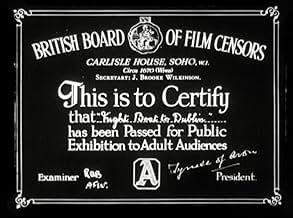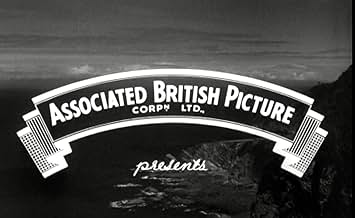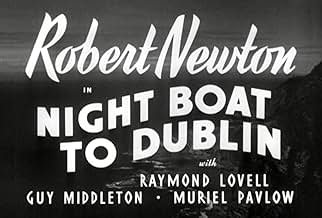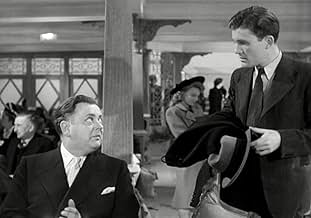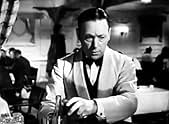IMDb RATING
6.2/10
476
YOUR RATING
The allies plan to rescue a Swedish atomic scientist from under the noses of the Nazis.The allies plan to rescue a Swedish atomic scientist from under the noses of the Nazis.The allies plan to rescue a Swedish atomic scientist from under the noses of the Nazis.
Scott Forbes
- Lieut. Allen
- (as Julian Dallas)
J. Hubert Leslie
- Ticket Collector
- (as Hubert Leslie)
Featured reviews
This 1946 British film is very much in the mould of John Buchan's 39 Steps, filmed in 1936 with the stylish Robert Donat, and as well the Ashenden stories. In all, the heroes had brains and style. This too is fairly exciting but not in the league of the others.
It perhaps is not obvious now but in just-post-war austerity rationed Britain, the Robert Newton character, as too his colleagues, is extremely well and stylishly dressed - the over-coats especially. Only the wealthy, film-stars or a gangster would have dressed like this at that time. Newton too is not simply stiff-upper lipped, he gives the character the full charismatic beans: low-key, cool and brave marks him as a man and a hero apart. Clever, resourceful, undaunted, stylish - this was the last call for the British filmic hero-star. It was the world of Ian Fleming as he would like it to be seen. (Bond on film was never obviously clever - it was the gadget which usually saved him).
From this time onwards, the hero who could out-think, out-drink and out-punch the enemy, and always get the girl, was imported principally from USA. Brits in British productions became reduced to supporting roles. If male, if a goody then slow-witted, loyal and liable to get shot. If baddies, clever but fatally flawed. If female, beautiful and life-long loyal to the hired-in hero. Bond marked a change but was never persuasively intelligent.
This film however has Newton as the brilliant brave Hero. Even Guy Middleton - perennial film drunken waster -gets a makeover in the brain and bravery departments. Like its wartime predecessors - the baddie often played by Raymond Lovell, who seemed to specialise in being something of a pushover though as here. Newton, as all heroes do,gets the girl - here the lovely Muriel Pavlow.
It perhaps is not obvious now but in just-post-war austerity rationed Britain, the Robert Newton character, as too his colleagues, is extremely well and stylishly dressed - the over-coats especially. Only the wealthy, film-stars or a gangster would have dressed like this at that time. Newton too is not simply stiff-upper lipped, he gives the character the full charismatic beans: low-key, cool and brave marks him as a man and a hero apart. Clever, resourceful, undaunted, stylish - this was the last call for the British filmic hero-star. It was the world of Ian Fleming as he would like it to be seen. (Bond on film was never obviously clever - it was the gadget which usually saved him).
From this time onwards, the hero who could out-think, out-drink and out-punch the enemy, and always get the girl, was imported principally from USA. Brits in British productions became reduced to supporting roles. If male, if a goody then slow-witted, loyal and liable to get shot. If baddies, clever but fatally flawed. If female, beautiful and life-long loyal to the hired-in hero. Bond marked a change but was never persuasively intelligent.
This film however has Newton as the brilliant brave Hero. Even Guy Middleton - perennial film drunken waster -gets a makeover in the brain and bravery departments. Like its wartime predecessors - the baddie often played by Raymond Lovell, who seemed to specialise in being something of a pushover though as here. Newton, as all heroes do,gets the girl - here the lovely Muriel Pavlow.
Decent spy thriller in which a reserved Robert Newton plays a military intelligence officer leading the hunt for a scientist who doesn't actually realise he has been abducted by Nazi spies. Newton leads a likeable cast which includes Guy Middleton, Herbert Lom, Muriel Pavlow, Leslie Dwyer, and the overlooked Raymond Lovell, who actually makes quite a personable villain.
During the last days of WWII, a Danish scientist is suspected to be working with the Nazis even if he is known for his anti-Hitler stance. Two intelligence officers discover a track leading to a relevant information leaki n Ireland and embark on the faithful night boat to Dublin. Only one is going to return with a plan to capture the spies... and he will even get married to keep his cover.
The plot, characters, and acting are engaging enough to keep you watching until dénouement.
The plot, characters, and acting are engaging enough to keep you watching until dénouement.
Robert Newton plays an MI5 man who infiltrates a gang of Nazi agents involved in the capture of a Swedish scientist whose work on developing the Atom bomb is being smuggled out via neutral Ireland. The eponymous night boat plays an important part in the early part of the story though most of the film takes place in England.
Not a film of any great depth, its intricate plot and considerable amount of dialogue is directed with speed and skill by Lawrence Huntington, adroitly steering around several implausibilities in the plot. There are likable performances from Robert Newton, and the admirable Raymond Lovell, who seemed to appear in every other 1940s British film, gives a typically urbane performance as the chief villain; John Ruddock is creepily sinister as his secretary. Newton is assisted by the jaunty Guy Middleton, and the pair get away with several double entendres.
With superb black and white photography by Otto Heller, it's a ripping yarn from a bygone age of trilby hats, clipped accents, and British pluck.
Not a film of any great depth, its intricate plot and considerable amount of dialogue is directed with speed and skill by Lawrence Huntington, adroitly steering around several implausibilities in the plot. There are likable performances from Robert Newton, and the admirable Raymond Lovell, who seemed to appear in every other 1940s British film, gives a typically urbane performance as the chief villain; John Ruddock is creepily sinister as his secretary. Newton is assisted by the jaunty Guy Middleton, and the pair get away with several double entendres.
With superb black and white photography by Otto Heller, it's a ripping yarn from a bygone age of trilby hats, clipped accents, and British pluck.
This film caught my attention solely on the basis of the title. An rather implausible wartime yarn of how British Military Intelligence attempt to track down a kidnapped Swedish scientist who may be on the verge of a major breakthrough in nuclear technology. The story moves along at pace on the basis of hunch and coincidence, but that said moves along in an enjoyable way. Robert Newton is fine as the lead, but the real star for me at least is Guy Middleton who provides amusing quips throughout. Edited by Flora Newton one of a number of women editors working in the British Film Industry at this time.
Did you know
- TriviaSmall speaking part for Wilfrid Hyde White as the taxi driver that drops the happy couple at the registrar.
- GoofsIf Grant is his real name, and Hunter pretends to know him from the army, he would call him by that name and not by a fake name when he pretends to meet him 'by accident' at the solicitor's office.
- Quotes
Taxi Driver: Getting married, sir?
Capt. David Grant: Well, if you must know - yes, I am.
Taxi Driver: Oh, dear dear dear dear... .
- ConnectionsReferenced in Muriel Pavlow in Conversation with Jo Botting (2024)
- SoundtracksI Shall Remember Tonight
Lyrics & Music Phil Park
- How long is Night Boat to Dublin?Powered by Alexa
Details
- Release date
- Country of origin
- Languages
- Also known as
- Night Boat to Dublin
- Filming locations
- Welwyn Studios, Welwyn Garden City, Hertfordshire, England, UK(studio: produced at Welwyn Studios Welwyn Garden City)
- Production company
- See more company credits at IMDbPro
- Runtime
- 1h 40m(100 min)
- Color
- Aspect ratio
- 1.37 : 1
Contribute to this page
Suggest an edit or add missing content

